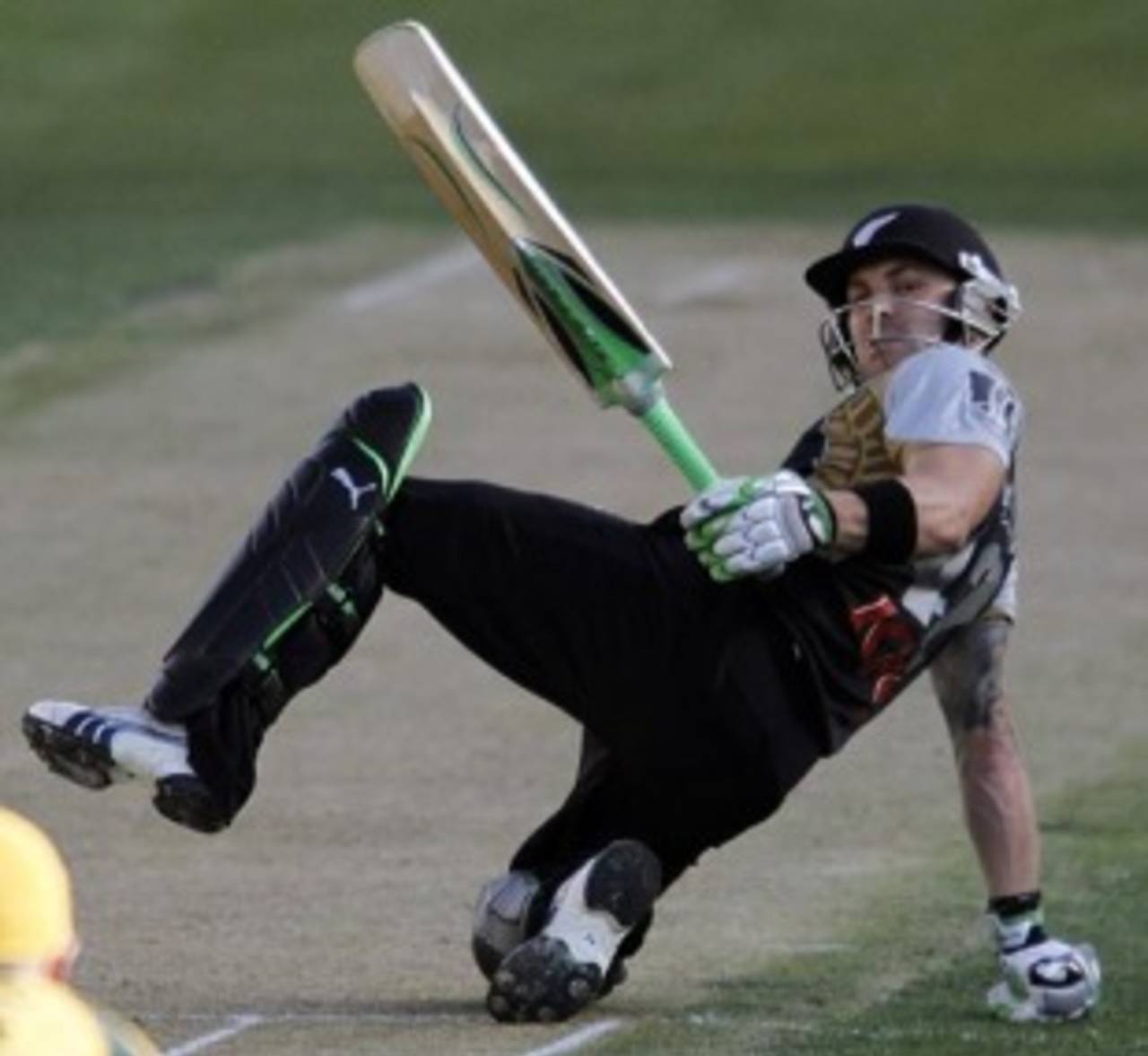Stodge and Splodge and Duckworth and Lewis
The one-Test doc, quinquagenarian Test players, most runs in ODIs and in Twenty20s, and more

Brendon McCullum is likely to be the first batsman to cross 1000 runs in Twenty20 • Getty Images
This one-cap wonder was the Australian opener George Thoms, who went in first with his Melbourne University club mate Colin McDonald in the final Test against West Indies in Sydney in 1951-52 (a third debutant was Richie Benaud). One Sydney newspaper, irate that two Victorians had been chosen to play at the SCG, observed icily: "It is expected that Stodge and Splodge will open the batting for Australia tomorrow". McDonald recalled: "We never did ask who was Stodge and who was Splodge. We were just happy to be there." Thoms didn't disgrace himself - he scored 16 and 28 - but after that season decided to put his career first. He later became one of Australia's leading gynaecologists.
The only time the method was used to decide the winner of one of the English domestic competitions was in 2000, when Gloucestershire won the 20th and last NatWest Trophy final at Lord's. No play was possible on the first scheduled day, but on the second Warwickshire scored 205 for 7 in their 45 overs. Gloucestershire were 122 for 3 when the rain returned in the 30th over of their reply - and no more play was possible. Warwickshire's Duckworth/Lewis score at the same point of their innings was 100, so Gloucestershire were declared the winners by 22 runs.
No one had done this when I wrote this - before the start of the World Twenty20 in the West Indies - but by the time you read it Brendon McCullum of New Zealand might well have become the first to four figures: he had 983 runs in Twenty20 internationals before the tournament started. Kevin Pietersen was quite a long way back in second place before the tournament, with 663 runs. For a list, which will be updated after each match day, click here.
The leading run-scorer before Tendulkar was another Indian, Mohammad Azharuddin, who finished his one-day international career in June 2000 with 9378 runs. Tendulkar passed that in October 2000, and has been in front ever since. Before Azharuddin the record was held (in reverse order, and starting from 1000 runs) by Desmond Haynes (8648 runs), Viv Richards (6721) and Greg Chappell (2331).
Five batsmen have scored a century in their first one-day international - and two of them signed off with a hundred in their final ODI too. England's Dennis Amiss made 103 in his first match, against Australia at Old Trafford in 1972, and 108 in his last one, against Australia at The Oval in 1977. Soon after that Desmond Haynes announced himself for West Indies with 148 against Australia in St John's in 1977-78, and he ended his long career with 115 against England in Port-of-Spain in 1993-94. For the record, the others to score a century on ODI debut are Andy Flower of Zimbabwe, Pakistan's Saleem Elahi, and Martin of Guptill of New Zealand.
This venerable cricketer is the slow left-armer Bert "Dainty" Ironmonger, who was already over 50 when he played in the infamous Ashes series of 1932-33. On the final day of his Test career, in the fifth Bodyline Test against England in Sydney, Ironmonger was 50 years and 327 days old. A fascinating character who fizzed the ball off the stump of a forefinger damaged in a childhood accident on the family farm, Ironmonger took 74 wickets at 17.97 in his 14 Tests, including the remarkable figures of 11 for 24 in the match against South Africa in Melbourne in 1931-32. Two of Test cricket's other half-centurions also played in the thirties: both Wilfred Rhodes (52) and George Gunn (50) represented England on their tour of the West Indies early in 1930. The other 50-year-old Test player was WG Grace of England in 1899.
Steven Lynch is the editor of the Cricinfo Guide to International Cricket. If you want to ask Steven a question, use our feedback form. The most interesting questions will be answered here each week. Ask Steven is now on Facebook